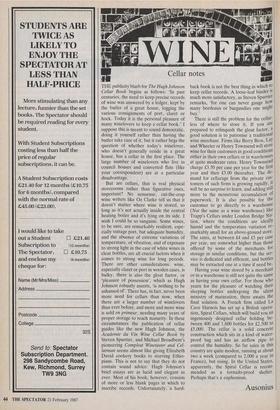Cellar notes
THE publicity blurb for The Hugh Johnson Cellar Book begins as follows: 'In past centuries, the need to keep precise records of wine was answered by a ledger, kept by the butler of a great house, logging the various consignments of port, claret or hock. Today it is the personal pleasure of many winelovers to keep a cellar book.' I suppose this is meant to sound democratic, doing it yourself rather than having the butler take care of it, but it rather begs the question of whether today's winelover, who doesn't generally reside in a great house, has a cellar in the first place. The large number of winelovers who live in council houses and converted flats (like your correspondent) are at a particular disadvantage.
But are cellars, that is real physical storerooms rather than figurative ones, important? No nonsense, cut-the-crap wine writers like Oz Clarke tell us that it doesn't matter where wine is stored, so long as it's not actually inside the central heating boiler and it's lying on its side. I wish I could be so sanguine. Some wines, to be sure, are remarkably resilient, espe- cially vintage port, but adequate humidity, and the absence of extreme variations of temperature, of vibration, and of exposure to strong light in the case of white wines in clear bottles, are all crucial factors when it comes to strong wine for long periods. There are other considerations: wine, especially claret or port in wooden cases, is bulky; there is also the gloat factor, or `pleasure of possession', which as Hugh Johnson robustly asserts, 'is nothing to be ashamed of. There has, in fact, never been more need for cellars than now, when there are a larger number of winelovers than ever before, and more and more wine is sold en primeur, needing many years of proper storage to reach maturity. In these circumstances the publication of cellar guides like the new Hugh Johnson, the Academie du Vin Wine Cellar Book by Steven Spurrier, and Michael Broadbent's pioneering Compleat Winetaster and Cel- larman seems almost like giving Elizabeth David cookery books to starving Ethio- pians. This is not to say that they do not contain sound advice: Hugh Johnson's brief essays are as lucid and elegant as ever. Most of his book, however, consists of more or less blank pages in which to inscribe records. Unfortunately, a hard- back book is not the best thing in which to keep cellar records. A loose-leaf binder Is much more satisfactory, as Steven Spurrier remarks, 'for one can hever gauge how many bordeaux or burgundies orie might buy.'
There is still the problem for the cellar- less of where to store it. If you are prepared to relinquish the gloat factor, a good solution is to patronise a traditional wine merchant. Firms like Berry Bros, Lay and Wheeler or Henry Townsend will store wine for their customers in good conditions either in their own cellars or in warehouses at quite moderate rates. Henry Townsend charge £3.50 per case per year for the first year and then £3.00 thereafter. The de- mand for cellarage from the private cus- tomers of such firms is growing rapidly, it will be no surprise to learn, and adding still more to the monstrous accumulation of paperwork. It is also possible for the customer to go directly to a warehouse (Not the same as a wine warehouse) like Trapp's Cellars under London Bridge Sta- tion, where the conditions are ideally humid and the temperature variation re- markably small for an above-ground store. The rates, at between £4 and £5 per case per year, are somewhat higher than those offered by some of the merchants for storage in similar conditions, but the ser- vice is dedicated and efficient, and bottles may be extracted one at a time if need be. Having your wine stored by a merchant or in a warehouse is still not quite the same as having your own cellar. For those who yearn for the pleasure of watching their sleeping bottles undergoing the silent ministry of maturation, there awaits the final solution. A French firm called La Cave Harnois has set up a British opera- tion, Spiral Cellars, which will build you an ingeniously designed cellar holding be- tween 400 and 1,600 bottles for £2,500 to £5,000. The cellar is a solid concrete construction which sits in a kind of water- proof bag and has an airflow pipe to control the humidity. So far sales in this country are quite modest, running at about two a week (compared to 2,000 a year in France), but rising. In the United States, apparently, the Spiral Cellar is recom- mended as a tornado-proof shelter. Perhaps that's a euphemism.
Ausonius


















































 Previous page
Previous page